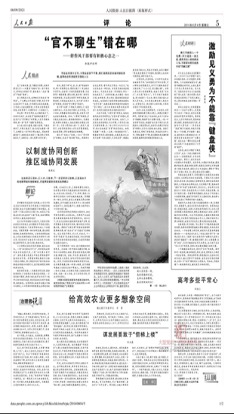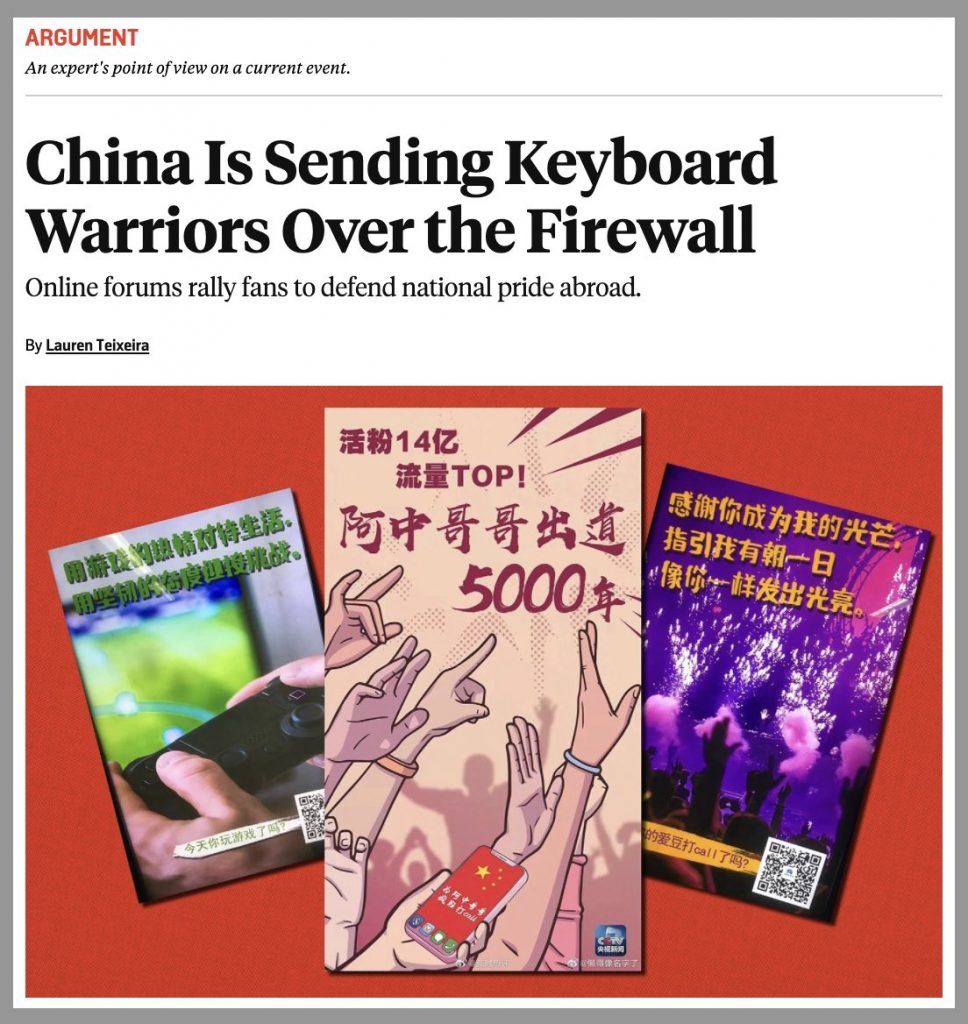Image by Ian Effendi available at Flickr.com under CC license.
The first uses of the term “keyboard warrior,” sometimes also translated “keyboard man,” emerged on the Chinese internet in the late 2000s to early 2010s, introduced from the English language, where the term was associated with those who, unable owing to physical weakness or a deficit of courage to express their anger face-to-face, resort instead to online attacks, hiding behind their anonymity. In English, the term could be used in the early to mid-2000s to refer simply to online gamers, often viewed through a particular stereotype: “The mythic keyboard warrior,” the International Herald Tribune reported in 2006, “is usually portrayed as a gangly teenage boy hypnotized in the moonlight before a computer screen flickering with assorted night elves, dwarves and the forsaken undead.” The term came, however, to be associated with online activism, including by those using the internet as a tool of resistance in more repressive environments. A report by Reuters in 2007, for example, cited a dissident blogger in Egypt who bemoaned the “futility of being a keyboard warrior in a country where nothing seems to matter to its people anymore.”
In China, the term “keyboard warrior” was used online initially to refer more generally to those who spoke strongly online, protected by anonymity, much like the English-language notion of the “internet troll.” But the term appears not to have been truly popularized in the mainstream media until it appeared in a commentary in the Chinese Communist Party’s official People’s Daily in 2014. The piece in question, “The Motivation for Courage and Righteousness Cannot Come From ‘Keyboard Warriors” (激励见义勇为不能靠’键盘侠’), discussed a vicious murder in May 2014 at a McDonald’s in Shandong province, during which witnesses had passively looked on (and even recorded with their mobile phones) as the victim, Wu Shuoyan, was brutally beaten by a group of attackers. The commentary harshly criticized the failure of onlookers to intervene in Wu’s attack, and it generally denounced those who resorted to making harsh comments online while they proved unwilling to act with courage in real life. Of those who talked online about justice and waffled and calculated the personal cost when the time came to act, the commentary said: “Just like those ‘keyboard warriors‘ that some satirize online, they stay out of the way when things go wrong, but express outrage online, and this ‘split’ is not conducive to the development of a healthy social culture.”

While the People’s Daily commentary often referred to in online Chinese sources, including Baidu Baike, as the origin of the term “keyboard warrior” in the simplified Chinese world, we can see from the commentary itself that the term was already a term in use online to refer disparagingly to those who profess values and speak strongly online but fail to back up their talk in the real world. After the June 2014 People’s Daily commentary, “keyboard warrior” was used more frequently in the state media, specifically when commenting on social and cultural issues that raised ethical questions. Of the 13 articles since 2014 that have mentioned “keyboard warriors” in the People’s Daily, nearly all use the term disparagingly to refer to those who sit back anonymously and fail to make real contributions to society.
In 2016, the term became heated as “key opinion leaders (or KOLs) on Weibo such as the Chinese comedian and video blogger Papi Jiang made videos and posts mocking “keyboard warriors” for being aggressive toward others and projecting their personal struggles and internal bitterness online while addressing complete strangers. In September that year, the Guangzhou Daily, the official newspaper of the southern city’s CCP committee, criticized cyberbullying by “keyboard warriors” and urged new legal measures. The paper accused “keyboard warriors” of abusing their right to online speech, using it as cover for unbridled attacks against others.

In a number of cases in recent years, the term “keyboard warrior” has been applied to those online who have been critical of the government, or who have been seen to work against China’s interests. In May 2018, after a firefighter died while responding to a fire in a high-rise building, he was referred to as a hero in a tribute from the local police department, but this was mocked by some commenters online, who questioned the safety procedures in place and asked who was to blame for the firefighter’s death. An article on Justice Online (正义网), a website operated by the official Procuratorate Daily (检察日报), railed against “keyboard warriors” who “wantonly insulted the firefighting martyrs.” Official reports have also talked about the need to better regulate the conduct of “keyboard warriors” to create a “cleaner” online space, and in June 2017, as China’s new Cybersecurity Law took effect, this topic was once again a focus.
While the conduct of “keyboard warriors” inside China, applied to those who gripe about the government or issue personal attacks against others, has been criticized in official state media, similarly troll-like activities that have aligned with the interests of the Party-state, including its foreign policy, have been spared the pejorative “keyboard warrior” label – suggesting that expressions of anti-foreign nationalism, and attacks on those who at home who are perceived to be unpatriotic, are viewed as acceptable forms of anonymous online outrage.
By contrast, foreign media have continually applied the English term “keyboard warrior” in recent years to Chinese who launch attacks against China’s perceived critics, both at home and abroad. Writing about the mobilization of Chinese netizens through Diba in 2019 to attack Taiwanese President Tsai Ing-wen’s Facebook page with memes against Taiwan independence, Foreign Policy called its article: “China Is Sending Keyboard Warriors Over the Firewall.” In August 2021, Bloomberg News gave an article about nationalist web users the headline: “How China’s Keyboard Warriors Are Silencing China’s Critics.”

Chinese-language coverage outside China of online nationalism in the country has also frequently applied the term “keyboard warrior” to cyber-nationalists. A story in FT Chinese in 2017 was headlined, “‘Keyboard Warriors’: China’s New Generation of Online Nationalists.” An article last year in the Chinese edition of the Wall Street Journal that deal with “ardent nationalism” under Xi Jinping reported: “Angry keyboard warriors have besieged the internet to crusade against any criticism of China’s leaders or perceived disloyalty to the country. Those targeted by them have been harassed or silenced. Some have lost their jobs.”
According to the understanding of “keyboard warrior” in much international media coverage of China, many incidents in recent years attacking foreign and domestic celebrities – such as the 2016 “Diba Expedition” (帝吧出征) – would lend themselves to use of the term. These might include, for example, the 2014 online onslaught against Hong Kong singer Denise Ho, the 2016 attack on Taiwanese singer Chou Tzu-yu, and the 2020 ostracizing of NBA general manager Daryl Morey. Foreign businesses, including brands like Nike and Dolce Gabbana, have also faced attacks from “keyboard warriors” when they have unwittingly crossed the line over sensitive territorial and political issues.

Stella Chen
The CMP Dictionary
C
D
F
G
M
N
P
S
- Scaling the Wall
- Science
- Second-Generation Reds
- Security
- Seeking Progress in Stability
- Seeking Truth From Facts
- Self-Revolution
- Seven Bottom Lines
- Six Adheres
- Smart Governance
- Sneaky Visit
- So-Called
- Socialite
- Soft Resistance
- Soul and Root
- Soundless Saturation / Quietly Nourishing
- Sovereignty
- Speaking Politics
- Streamlining Services
- Strong Cyber Power